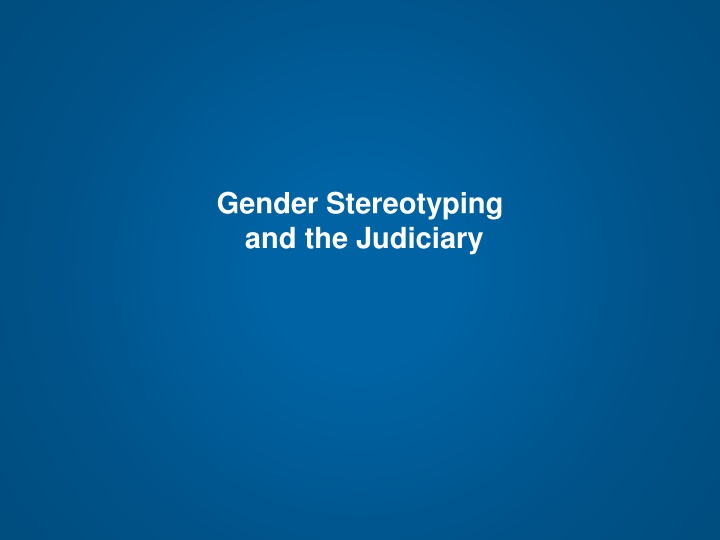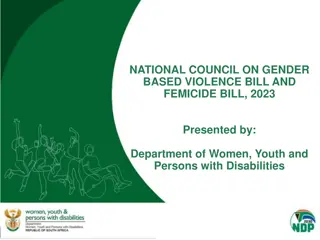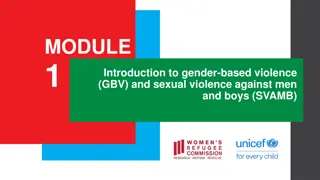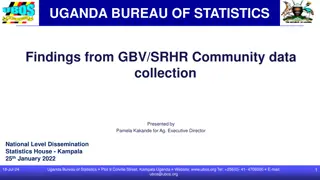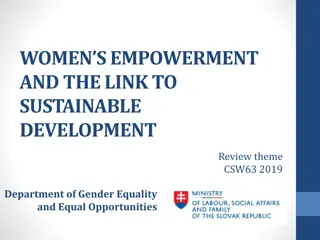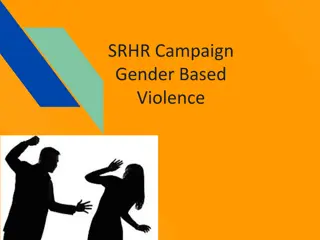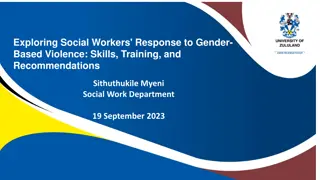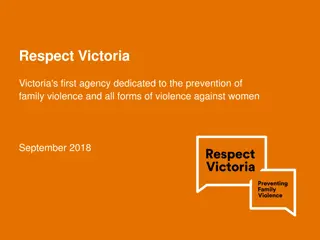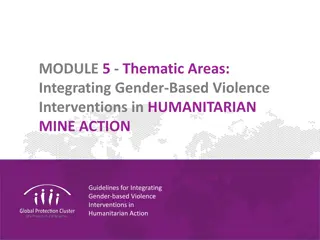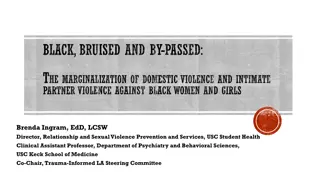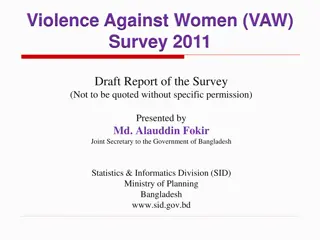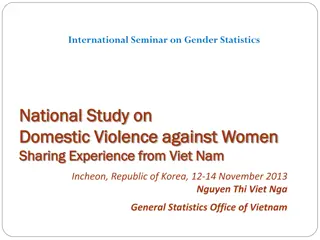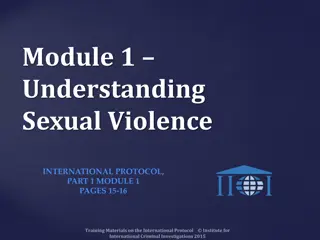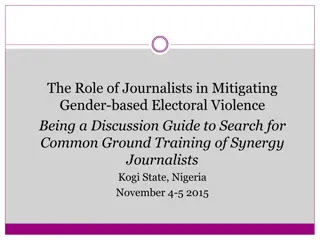Gender-based Violence Against Women in the Judiciary
Gender-based violence against women refers to violence directed at women because of their gender, encompassing physical, mental, and sexual harm, coercion, and deprivation of liberty. The judiciary plays a crucial role in addressing wrongful gender stereotyping in gender-based violence cases to ensure fair treatment and justice for women. International recommendations emphasize the importance of refraining from discriminatory practices, applying criminal law provisions effectively, and providing impartial legal procedures to combat gender-based violence.
Download Presentation

Please find below an Image/Link to download the presentation.
The content on the website is provided AS IS for your information and personal use only. It may not be sold, licensed, or shared on other websites without obtaining consent from the author.If you encounter any issues during the download, it is possible that the publisher has removed the file from their server.
You are allowed to download the files provided on this website for personal or commercial use, subject to the condition that they are used lawfully. All files are the property of their respective owners.
The content on the website is provided AS IS for your information and personal use only. It may not be sold, licensed, or shared on other websites without obtaining consent from the author.
E N D
Presentation Transcript
Gender Stereotyping and the Judiciary
Session 4. Gender stereotyping in gender-based violence (GBV) cases 1. Gender-based violence and human rights law 2. Harmful gender stereotypes as a root cause of gender-based violence 3. Common stereotypes in gender-based violence cases 4. Role of judges in addressing wrongful stereotyping in GBV cases
What is the gender-based violence against women? Gender-based violence against women refers to "violence that is directed against a woman because she is a woman or that affects women disproportionately". It includes acts that inflict physical, mental or sexual harm or suffering, threats of such acts, coercion and other deprivations of liberty.
CEDAW General Recommendation 35 At the judicial level ( ), all judicial bodies are required to refrain from engaging in any act or practice of discrimination or gender-based violence against women; and to strictly apply all criminal law provisions punishing this violence, ensuring all legal procedures in cases involving allegations of gender-based violence against women are impartial and fair, and unaffected by gender stereotypes or discriminatory interpretation of legal provisions, including international law. The application of preconceived and stereotyped notions of what constitutes gender-based violence against women, what women s responses to such violence should be and the standard of proof required to substantiate its occurrence can affect women s right to the enjoyment of equality before the law, fair trial and the right to an effective remedy.
CEDAW General Recommendation 35 Countries must: Prohibit all forms of GBV by State and non-State actors, including through legislation, policies and protocols; Prevent, investigate and punish all forms of GBV, in particular sexual violence perpetrated by State and non-State actors, and implement a policy of zero tolerance; Ensurewomen s and girls access to justice; adopt gender- sensitive investigative procedures to address gender-based violence, in particular sexual violence; conduct gender-sensitive training and adopt codes of conduct and protocols for the police and military, including peacekeepers; and build the capacity of the judiciary, including in the context of transitional justice mechanisms, to impartiality and integrity; ensure its independence,
Example: V.K. vs Bulgaria case In holding the State Party accountable, CEDAW affirmed that States Parties are accountable for judicial stereotyping that violates CEDAW. CEDAW stressed that stereotyping affects women s right to a fair trial and that the judiciary must be careful not to create inflexible standards based on preconceived notions of what constitutes domestic or gender-based violence . In its recommendations, CEDAW urged the Philippines to provide mandatory training for judges on the Law on Protection against Domestic Violence, including the definition of domestic violence and on gender stereotypes .
States obligations to ensure justice for victims and survivors Rights to nondiscrimination and equality Stereotyping is a root cause and consequence of discrimination Rights to equality before courts and tribunals and to a fair trial These guarantees aim to ensure the proper administration and enforcement of justice at all stages of legal proceedings an by all courts and tribunals Right to an effective remedy [e]ffective complaints procedures and remedies, including compensation [c]riminal penalties where necessary and civil remedies in case of domestic violence [e]ffective legal measures, including penal sanctions, civil remedies and compensatory provisions to protect women against all kinds of violence
Judicial stereotyping & right to non- discrimination and equality In Atala Riffo and Daughters v. Chile, the Inter-American Court of Human Rights recognised that judicial stereotyping is a form of discrimination and inequality. although the Judgment of the Supreme Court and the provisional custody ruling sought to protect the best interests of the girls ( ), it was not demonstrated that the grounds stated in the decisions were appropriate to achieve said purpose, since the Supreme Court of Justice and the Juvenile Court of Villarrica did not prove in this specific case that Ms. Atala s cohabitation with her partner had a negative effect on the girls best interest ( .), On the contrary, they used abstract, stereotyped, and/or discriminatory arguments to justify their decisions ( ), for which reason said decisions constitute discriminatory treatment against Ms. Atala" (emphasis added).
Judicial stereotyping and the rights to equality before courts and tribunals and to a fair trial In Karen Tayag Vertido v. The Philippines, the CEDAW Committee stressed that: Stereotyping affects women s right to a fair and just trial and that the judiciary must take caution not to create inflexible standards of what women or girls should be or what they should have done when confronted with a situation of rape based merely on preconceived notions of what defines a rape victim or a victim of gender-based violence (an ideal victim , in general).
Right to an effective remedy In R.P.B. v. The Philippines, the CEDAW Committee explained that: for a remedy to be effective, adjudication of a case involving rape and sexual offences claims should be dealt with in a fair, impartial, timely and expeditious manner. It further recall[ed] its general recommendation No. 18, where it observed that disabled women are considered as a vulnerable group , who suffer from a double discrimination linked to their special living conditions . In this context, the Committee emphasize[d] that it is crucial to ensure that women with disabilities enjoy effective protection against sex and gender-based discrimination by States parties and have access to effective remedies.
Common stereotypes in GBV cases The ideal victim She was asking for it : blaming victim for own fate Women who experience domestic violence have only themselves to blame Women are inherently untruthful and therefore more likely to fabricate allegations
Commonly found stereotypes that affect women s access to justice Women are more nurturing than men and should housewives/caregivers Men should be heads of households Women should be chaste Women s demands for equal pay are not justified as they are likely to stop work to have children Women s careers are secondary to their roles as mothers and carers Women s objectification in the media reinforces the notion that they are subordinate to men
Stereotypes about perpetrators and victims Men as perpetrators: Entitlement to control women Inability to control own sexual urges Women as perpetrators of violent crimes, including against men Other gender norms and expectations when dealing with LGBT, for e.g.
How Judiciaries may apply, enforce and perpetuate stereotypes 1. by substituting stereotypes for law and facts in evidence. 2. by failing to explicitly challenge stereotyping, for example by lower courts or the parties to legal proceedings
How judges challenge stereotyping Closer judicial scrutiny or recognising as red flags cases prohibited basis for discrimination The role of experts and amicus curiae that involve Judges have a responsibility to uphold the fairness and integrity of the justice system by ensuring that gender-based violence trials are conducted in a fashion that does not subordinate the fact-finding process to myth and stereotype
How stereotyping undermines access to justice Stereotyping can compromise the impartiality of judges decisions Stereotyping can influence judges understanding of the nature of the criminal offense Stereotyping can affect judges views about witness credibility and legal capacity Stereotyping can stop judges holding offenders legally accountable Stereotyping can impede access to legal rights and protections
